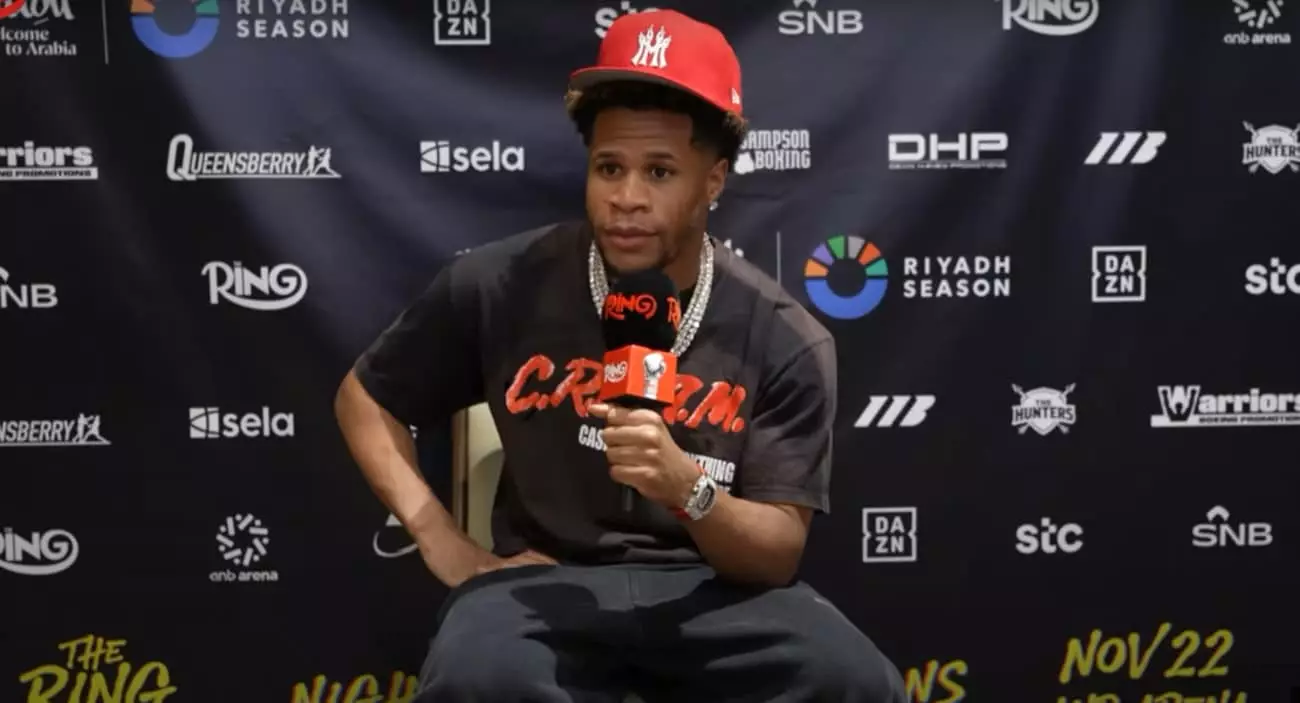Devin Haney’s recent declaration that he will demonstrate he’s “levels above” WBO welterweight champion Brian Norman Jr. is a statement rooted in confidence, yet it surfaces as a complex mixture of bravado and expectation. Haney’s assertion that this fight in Riyadh will showcase his dominance is not just about the bout itself but also a reflection of his desire to establish a narrative of superiority. From the outset, Haney positions himself as the more experienced fighter, claiming that Norman Jr.’s first foray into the high-caliber realm will be a decisive moment for both fighters’ reputations.
However, this bravado can be scrutinized. Haney’s confidence is commendable, but it risks oversimplifying the competitive landscape. Labeling Norman Jr. as an inexperienced “rookie” might serve promotional purposes, but it overlooks Norman’s actual capabilities and the unpredictability inherent in boxing. The assertion that Norman Jr. is “too much” for his opponent may be an overstatement driven by Haney’s need to assert dominance, rather than a realistic appraisal of the contest’s potential complexities.
The Myth of Absolute Superiority in a Saturated Division
While Haney is eager to elevate himself as the best at 147 pounds, the reality of modern boxing suggests a far more fragmented hierarchy. Claiming the mantle of “the best” requires more than a single victory, especially against a fighter making his first significant step up in class. Haney’s tally of wins over seasoned yet aging opponents like Linares and Ramirez is often critiqued as underwhelming, considering their declines and the controversies surrounding some of those matchups.
The fight in Riyadh, with its promotional emphasis on entertainment and spectacle, adds another layer of complexity. Judging can be heavily influenced by factors outside pure skill—local bias, fight narrative, and fight strategy play significant roles. If Haney attempts to box cautiously against Norman Jr., relying on points rather than active engagement, he risks ceding favor with the judges, especially in an environment that favors exciting, aggressive fights. Yet, if he dares to exchange, he must also reckon with the possibility that Norman Jr., who is still unproven at the highest levels, might surprise with power and resilience.
Experience vs. Youth: A False Dichotomy?
A central theme in Haney’s rhetoric is the contrast between experience and youth, with Haney positioning himself as a seasoned veteran and Norman Jr. as a newcomer to the elite stage. However, upon closer analysis, this dichotomy appears superficial. Many of Haney’s “best” wins are on the decline or contested, and accusations of favoritism and questionable decision-making mar his record. Conversely, Norman Jr., despite being new to top-tier opposition, might possess raw talent, athleticism, and hunger that cannot be dismissed lightly.
The fight’s location in Riyadh, along with several stipulations by the organizers, suggests that the outcome may be influenced by factors beyond skill alone. Judges in the region are often perceived as playing a role in shaping fight results, especially when entertainment is prioritized. Haney’s previous fights, such as his controversial decision over Lomachenko, reveal that even highly touted prospects can be gifted victories, hinting that the true test is not just about what happens in the ring but also about how the fight is perceived.
What Does True Greatness Require?
In the broader picture, Haney’s boast of being “levels above” Norman Jr. underscores an optimistic, perhaps naive, understanding of what it takes to be considered the best. Achieving that status demands consistency, quality competition, and the ability to adapt under pressure. Beating just one or two opponents, irrespective of their caliber, doesn’t automatically elevate a fighter’s standing.
Haney’s challenge extends beyond the physical. It’s a test of mental toughness, strategic adaptability, and the capacity to perform under the spotlight. If he underestimates Norman Jr. and opts for a passive, cautious approach, he risks losing credibility. Conversely, if he fights with intensity and determination, he might affirm his claim, but only if he genuinely outperforms his opponent rather than relying on reputation or persuasive rhetoric.
Ultimately, Haney’s bold statements reveal a fighter eager to assert dominance and rewrite his narrative. But true greatness in boxing isn’t just spoken into existence; it must be earned through consistent action, resilience against adversity, and the humility to acknowledge the unpredictability of competition. Whether he accomplishes this against Norman Jr. remains to be seen, but his confidence alone cannot substitute for real achievement in the sport’s brutal reality.


Leave a Reply